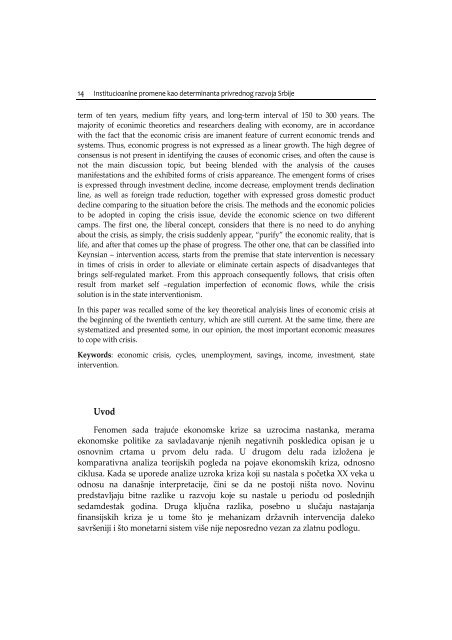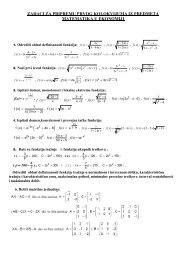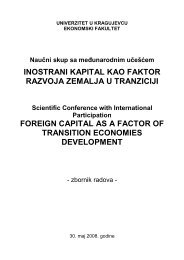- Page 1 and 2: INSTITUCIONALNE PROMENE KAO DETERMI
- Page 3 and 4: SADRŽAJ Predgovor ................
- Page 5 and 6: PREDGOVOR U ovom Zborniku objavljuj
- Page 7 and 8: NEOPHODNOST PRIMJENE INSTITUCIONALN
- Page 9 and 10: Neophodnost primjene institucionaln
- Page 11 and 12: Neophodnost primjene institucionaln
- Page 13 and 14: Neophodnost primjene institucionaln
- Page 15 and 16: Neophodnost primjene institucionaln
- Page 17: Neophodnost primjene institucionaln
- Page 22 and 23: 16 Institucioanlne promene kao dete
- Page 24 and 25: 18 Institucioanlne promene kao dete
- Page 26 and 27: 20 Institucioanlne promene kao dete
- Page 28 and 29: 22 Institucioanlne promene kao dete
- Page 30 and 31: 24 Institucioanlne promene kao dete
- Page 32 and 33: 26 Institucioanlne promene kao dete
- Page 34 and 35: 28 Institucioanlne promene kao dete
- Page 36 and 37: 30 Institucioanlne promene kao dete
- Page 38 and 39: 32 Institucioanlne promene kao dete
- Page 40 and 41: 34 Institucioanlne promene kao dete
- Page 42 and 43: 36 Institucioanlne promene kao dete
- Page 44 and 45: 38 Institucioanlne promene kao dete
- Page 46 and 47: 40 Institucioanlne promene kao dete
- Page 48 and 49: 42 Institucioanlne promene kao dete
- Page 50 and 51: 44 Institucioanlne promene kao dete
- Page 52 and 53: 46 Institucioanlne promene kao dete
- Page 54 and 55: 48 Institucioanlne promene kao dete
- Page 56 and 57: 50 Institucioanlne promene kao dete
- Page 58 and 59: 52 Institucioanlne promene kao dete
- Page 60 and 61: 54 Institucioanlne promene kao dete
- Page 62 and 63: 56 Institucioanlne promene kao dete
- Page 64 and 65: 58 Institucioanlne promene kao dete
- Page 67 and 68: ZNAČAJ EKONOMIJE KONVENCIJA ZA EKO
- Page 69 and 70: Značaj ekonomije konvencija za eko
- Page 71 and 72:
Značaj ekonomije konvencija za eko
- Page 73 and 74:
Značaj ekonomije konvencija za eko
- Page 75 and 76:
Značaj ekonomije konvencija za eko
- Page 77:
Značaj ekonomije konvencija za eko
- Page 80 and 81:
74 Institucioanlne promene kao dete
- Page 82 and 83:
76 Institucioanlne promene kao dete
- Page 84 and 85:
78 Institucioanlne promene kao dete
- Page 86 and 87:
80 Institucioanlne promene kao dete
- Page 88 and 89:
82 Institucioanlne promene kao dete
- Page 90 and 91:
84 Institucioanlne promene kao dete
- Page 92 and 93:
86 Institucioanlne promene kao dete
- Page 94 and 95:
88 Institucioanlne promene kao dete
- Page 96 and 97:
90 Institucioanlne promene kao dete
- Page 98 and 99:
92 Institucioanlne promene kao dete
- Page 100 and 101:
94 Institucioanlne promene kao dete
- Page 102 and 103:
96 Institucioanlne promene kao dete
- Page 104 and 105:
98 Institucioanlne promene kao dete
- Page 106 and 107:
100 Institucioanlne promene kao det
- Page 108 and 109:
102 Institucioanlne promene kao det
- Page 111 and 112:
INDUSTRIJA SRBIJE - DRUGI TALAS GLO
- Page 113 and 114:
Industrija Srbije - drugi talas glo
- Page 115 and 116:
Industrija Srbije - drugi talas glo
- Page 117 and 118:
Industrija Srbije - drugi talas glo
- Page 119 and 120:
Industrija Srbije - drugi talas glo
- Page 121 and 122:
Industrija Srbije - drugi talas glo
- Page 123 and 124:
Industrija Srbije - drugi talas glo
- Page 125 and 126:
Industrija Srbije - drugi talas glo
- Page 127 and 128:
Industrija Srbije - drugi talas glo
- Page 129 and 130:
Industrija Srbije - drugi talas glo
- Page 131 and 132:
Industrija Srbije - drugi talas glo
- Page 133 and 134:
Industrija Srbije - drugi talas glo
- Page 135 and 136:
Industrija Srbije - drugi talas glo
- Page 137 and 138:
Industrija Srbije - drugi talas glo
- Page 139:
Industrija Srbije - drugi talas glo
- Page 142 and 143:
136 Institucioanlne promene kao det
- Page 144 and 145:
138 Institucioanlne promene kao det
- Page 146 and 147:
140 Institucioanlne promene kao det
- Page 148 and 149:
142 Institucioanlne promene kao det
- Page 150 and 151:
144 Institucioanlne promene kao det
- Page 152 and 153:
146 Institucioanlne promene kao det
- Page 154 and 155:
148 Institucioanlne promene kao det
- Page 156 and 157:
150 Institucioanlne promene kao det
- Page 158 and 159:
152 Institucioanlne promene kao det
- Page 161 and 162:
INVESTICIONI AMBIJENT KAO DETERMINA
- Page 163 and 164:
Investicioni ambijent kao determina
- Page 165 and 166:
Investicioni ambijent kao determina
- Page 167 and 168:
Investicioni ambijent kao determina
- Page 169 and 170:
Investicioni ambijent kao determina
- Page 171 and 172:
Investicioni ambijent kao determina
- Page 173 and 174:
Investicioni ambijent kao determina
- Page 175 and 176:
Investicioni ambijent kao determina
- Page 177 and 178:
Investicioni ambijent kao determina
- Page 179 and 180:
Investicioni ambijent kao determina
- Page 181:
Investicioni ambijent kao determina
- Page 184 and 185:
178 Institucioanlne promene kao det
- Page 186 and 187:
180 Institucioanlne promene kao det
- Page 188 and 189:
182 Institucioanlne promene kao det
- Page 190 and 191:
184 Institucioanlne promene kao det
- Page 192 and 193:
186 Institucioanlne promene kao det
- Page 194 and 195:
188 Institucioanlne promene kao det
- Page 196 and 197:
190 Institucioanlne promene kao det
- Page 198 and 199:
192 Institucioanlne promene kao det
- Page 200 and 201:
194 Institucioanlne promene kao det
- Page 202 and 203:
196 Institucioanlne promene kao det
- Page 204 and 205:
198 Institucioanlne promene kao det
- Page 206 and 207:
200 Institucioanlne promene kao det
- Page 208 and 209:
202 Institucioanlne promene kao det
- Page 210 and 211:
204 Institucioanlne promene kao det
- Page 212 and 213:
206 Institucioanlne promene kao det
- Page 214 and 215:
208 Institucioanlne promene kao det
- Page 216 and 217:
210 Institucioanlne promene kao det
- Page 219 and 220:
VELIČINA I OTVORENOST PRIVREDE KAO
- Page 221 and 222:
Veličina i otvorenost privrede kao
- Page 223 and 224:
Veličina i otvorenost privrede kao
- Page 225 and 226:
Veličina i otvorenost privrede kao
- Page 227 and 228:
Veličina i otvorenost privrede kao
- Page 229 and 230:
Veličina i otvorenost privrede kao
- Page 231 and 232:
Veličina i otvorenost privrede kao
- Page 233 and 234:
Veličina i otvorenost privrede kao
- Page 235 and 236:
INSTITUCIJE FINANSIRANJA IZVOZNIH P
- Page 237 and 238:
Institucije finansiranja izvoznih p
- Page 239 and 240:
Institucije finansiranja izvoznih p
- Page 241 and 242:
Institucije finansiranja izvoznih p
- Page 243 and 244:
Institucije finansiranja izvoznih p
- Page 245 and 246:
Institucije finansiranja izvoznih p
- Page 247 and 248:
Institucije finansiranja izvoznih p
- Page 249 and 250:
Institucije finansiranja izvoznih p
- Page 251 and 252:
Institucije finansiranja izvoznih p
- Page 253:
Institucije finansiranja izvoznih p
- Page 256 and 257:
250 Institucioanlne promene kao det
- Page 258 and 259:
252 Institucioanlne promene kao det
- Page 260 and 261:
254 Institucioanlne promene kao det
- Page 262 and 263:
256 Institucioanlne promene kao det
- Page 264 and 265:
258 Institucioanlne promene kao det
- Page 266 and 267:
260 Institucioanlne promene kao det
- Page 268 and 269:
262 Institucioanlne promene kao det
- Page 270 and 271:
264 Institucioanlne promene kao det
- Page 272 and 273:
266 Institucioanlne promene kao det
- Page 274 and 275:
268 Institucioanlne promene kao det
- Page 276 and 277:
270 Institucioanlne promene kao det
- Page 278 and 279:
272 Institucioanlne promene kao det
- Page 280 and 281:
274 Institucioanlne promene kao det
- Page 282 and 283:
276 Institucioanlne promene kao det
- Page 284 and 285:
278 Institucioanlne promene kao det
- Page 286 and 287:
280 Institucioanlne promene kao det
- Page 288 and 289:
282 Institucioanlne promene kao det
- Page 290 and 291:
284 Institucioanlne promene kao det
- Page 292 and 293:
286 Institucioanlne promene kao det
- Page 294 and 295:
288 Institucioanlne promene kao det
- Page 296 and 297:
290 Institucioanlne promene kao det
- Page 298 and 299:
292 Institucioanlne promene kao det
- Page 300 and 301:
294 Institucioanlne promene kao det
- Page 302 and 303:
296 Institucioanlne promene kao det
- Page 304 and 305:
298 Institucioanlne promene kao det
- Page 306 and 307:
300 Institucioanlne promene kao det
- Page 308 and 309:
302 Institucioanlne promene kao det
- Page 310 and 311:
304 Institucioanlne promene kao det
- Page 312 and 313:
306 Institucioanlne promene kao det
- Page 314 and 315:
308 Institucioanlne promene kao det
- Page 316 and 317:
310 Institucioanlne promene kao det
- Page 318 and 319:
312 Institucioanlne promene kao det
- Page 320 and 321:
314 Institucioanlne promene kao det
- Page 322 and 323:
316 Institucioanlne promene kao det
- Page 324 and 325:
318 Institucioanlne promene kao det
- Page 326 and 327:
320 Institucioanlne promene kao det
- Page 328 and 329:
322 Institucioanlne promene kao det
- Page 330 and 331:
324 Institucioanlne promene kao det
- Page 333 and 334:
ULOGA JAVNE REVIZIJE U PREVAZILAŽE
- Page 335 and 336:
Uloga javne revizije u prevazilaže
- Page 337 and 338:
Uloga javne revizije u prevazilaže
- Page 339 and 340:
Uloga javne revizije u prevazilaže
- Page 341 and 342:
Uloga javne revizije u prevazilaže
- Page 343:
Uloga javne revizije u prevazilaže
- Page 347 and 348:
Institucioanlne promene kao determi
- Page 349 and 350:
Institucioanlne promene kao determi
- Page 351 and 352:
Institucioanlne promene kao determi
- Page 353 and 354:
Institucioanlne promene kao determi






